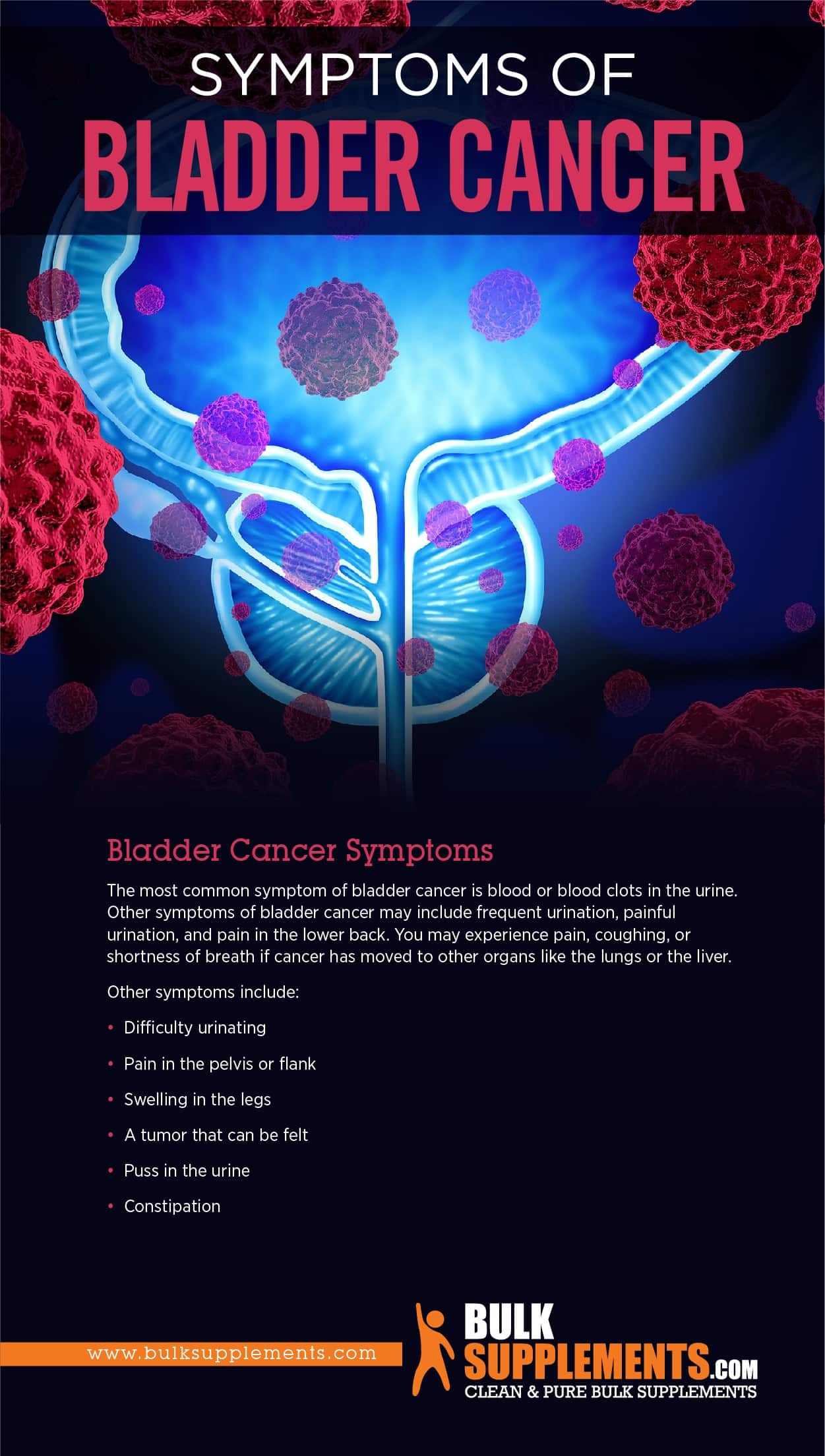Bladder Cancer: Symptoms, Causes & Treatment

Bladder Cancer
What is Bladder Cancer?
Bladder cancer is the fifth-most destructive cancer in the U.S. and the fourth-most common cancer in men. About 9 out of 10 people with this cancer are over the age of 55. It occurs more often in men than women and more often in whites than any other race or ethnicity.
A person with bladder cancer is likely to have one or more tumors in his/her bladder. Cancer forms when cells of the bladder grow abnormally, and if the tumor is not removed or checked, the cells will spread in the body (metastasize).
Types of Bladder Cancer
There are different types of bladder cancer, most of which develop on the inner lining of the bladder:
- Urothelial cancer is the most common type of bladder cancer
- Squamous cell carcinoma, though it is fairly uncommon, starts in nerve-like cells
- Adenocarcinoma develops from glandular cells and is usually invasive
- Sarcoma is quite rare but, unlike the other types of cancer, it begins inside of the muscle cells of the bladder
Bladder Cancer Symptoms
The most common symptom of bladder cancer is blood or blood clots in the urine. Other symptoms of bladder cancer may include frequent urination, painful urination, and pain in the lower back. You may experience pain, coughing, or shortness of breath if cancer has moved to other organs like the lungs or the liver.
Other symptoms include:
- Difficulty urinating
- Pain in the pelvis or flank
- Swelling in the legs
- A tumor that can be felt
- Puss in the urine
- Constipation

Causes of Bladder Cancer
Though the exact cause of bladder cancer is unknown, researchers have identified a number of risk factors:
- Smoking tobacco is linked to bladder cancer. In fact, smokers are four times more likely to develop bladder cancer. On the positive side, quitting smoking can greatly reduce the risk over time.
- Radiation of the pelvis area, a common treatment for uterine cancer, increases the risk of bladder cancer.
- A nuclear accident or exposure to radiation in the work environment.
- Schistosomiasis is a chronic infection caused by the parasitic flatworms called schistosomes, found in some African and Middle Eastern countries. It rarely occurs in the U.S. but travelers may be infected overseas
Other Risk Factors
- Exposure to chemicals used in dye manufacturing, rubber, leather, textile or paint product industries
- Repeated bladder or urinary tract infections
- Long-term catheter use, which can cause inflammation
- Bladder stones
- Bladder birth defects
- Previous long-term cancer treatment with cyclophosphamide or ifosfamide
- Ongoing exposure to cadmium from soil
- Cancer in any part of the urinary tract
- Exposure to the agricultural pesticides like chlorophenoxy, organochlorine, imazethapyr and imazaquin
Bladder Cancer Remedies and Supplements
Standard bladder cancer treatments include surgery, chemotherapy, radiation, immunotherapy or intravesical treatment (directly into the bladder), or a combination. These treatments take a toll on the body and there are a number of natural remedies and supplements to help you deal with the side effects of treatment.
The remedies listed here are by no means a substitute for legitimate medical advice. Always talk to a doctor before taking any supplements.
Vitamin C
Ascorbic acid has many functions in the body. It is an essential nutrient that keeps the body functioning. First of all, it promotes collagen production. Secondly, it reduces DNA damage. Above all, it boosts the immune system and protects against various disease.
Numerous studies indicate that vitamin C inhibits cancer cell activity and interacts with specific drugs. In one study, vitamin C inhibited bladder tumor growth. When combined with oral and intravenous administration, Vitamin C reduces inflammation and decreases the side effects of cancer treatment. Given these points, long-term use of vitamin C supplements can greatly reduce the risk of cancer.
Needless to say, Vitamin C is a powerful antioxidant that protects cellular health. For the simple reason that the body is not capable of making its own Vitamin C internally, it must be obtained regularly from diet or supplements.
SEE ALSO

Blepharitis Symptoms, Causes & Treatment
Ginger
Nausea and vomiting are unpleasant side effects of chemotherapy.
It is a common occurrence in more than 70% of cancer-related illnesses. A number of studies have shown that ginger may be helpful in reducing or eliminating the nausea and vomiting that occurs during and after chemotherapy treatments.
Ginger root extract powder is an age-old remedy with proven healing properties. Ginger contains phenolic compounds such gingerol, paradol and shogoal that have antioxidant and anti-cancer properties. It’s been proven to reduce cancer-related fatigue, increase appetite in cancer patients and improve overall quality of life in a number of studies. However, it should not be taken without your doctor’s approval since the use of ginger may not fit your specific health circumstances.
Chamomile
Long-term chronic inflammation plays a role in cancer development. Chamomile contains apigenin, a flavonoid with anti-inflammatory, antitumor and antioxidant properties. Studies show that apigenin is a bioactive flavanoid with antioxidant and anti-inflammatory properties. As an anti-inflammatory, anti-histamine, calming agent and digestive aid, chamomile extract powder is a powerful supplement that may be effective at relieving pain, fighting infection and improving sleep.
Acupuncture
Indeed, the nausea and vomiting which commonly occurs in patients undergoing chemotherapy can be worse than the disease itself. However, acupuncture can be helpful in managing the pain, nausea and vomiting associated with cancer. Combining acupuncture with medication has proven to be highly effective at preventing vomiting. A number of studies suggest that it works by de-activating the source of pain by modulating endorphin levels within the central nervous system.
Other Remedies and Supplements
- Frankincense seems to activate genes that can cause cancer cell death and suppress tumor growth in bladder cancer. As an anti-inflammatory, it may help to prevent cancer.
- Probiotics may boost immunity to bladder cancer and cancer cell death.
- Long-term use of vitamin E may reduce the risk of bladder cancer and bladder cancer mortality, especially in smokers. Note that dosages exceeding 1,000 mg daily may have side effects.
- The regular intake of natural folate may curb the progression of bladder cancer.
- Some aromatherapy oils may help with the side effects of cancer treatment such as nausea, vomiting, stress, depression, pain and inflammation.
Healthy Habits to Prevent Bladder Cancer
- Drink plenty of fluids throughout the day
- Regularly eating dark-green, yellow-orange and cruciferous vegetables and tomato products
- Selenium (dosages exceeding 15 mcg to 55 mcg daily may be toxic)
- Being physically active
- Regularly drinking black tea
The Bottom Line
There is no definite way to prevent bladder cancer. To reduce your risk of obtaining bladder cancer, avoid exposure to carcinogenic chemicals, stay active, drink plenty of fluids and do not smoke. To help keep you strong and cope with treatment, there are a number of remedies and supplements available. A bladder cancer diagnosis is a life-changing event, and due to the high rate of recurrence, patients need to see their doctors and consultants regularly to make sure it does not return.



